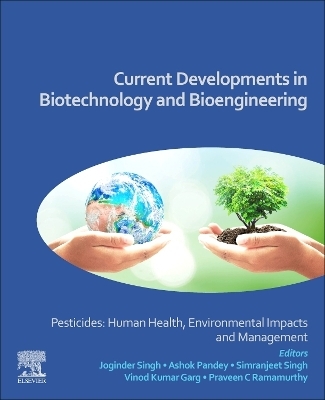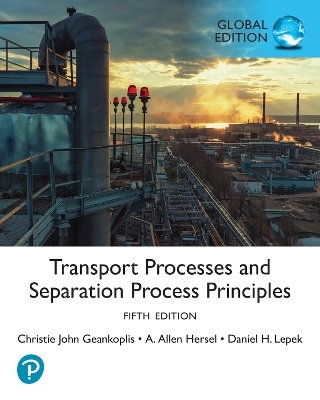
Current Developments in Biotechnology and Bioengineering
Elsevier - Health Sciences Division (Verlag)
978-0-323-91900-5 (ISBN)
Prof. Joginder Singh is a Professor at the Department of Botany, Nagaland University, Lumami, Nagaland, India. Previously, he worked as a Professor in the School of Bioengineering and Biosciences, Lovely Professional University and also as a Young Scientist at Microbial Biotechnology and Biofertilizer Laboratory, Department of Botany, Jai Narain Vyas University on a research project funded by the Department of Science and Technology, Government of India. He is an active member of various scientific societies and organizations, including the Association of Microbiologists of India, the Indian Society of Salinity Research Scientists, the Indian Society for Radiation Biology, and the European Federation of Biotechnology. He has published extensively with Elsevier and Springer both in journals and books. He serves as a reviewer for many prestigious journals, including Current Research in Engineering, Science and Technology; Journal of Cleaner Production; Science of the Total Environment; Environmental Monitoring and Assessment; Pedosphere; Soil and Sediment Contamination; Symbiosis; International Journal of Phytoremediation; Ecotoxicology and Environmental Safety; Annals of Agricultural Sciences; and Annals of the Brazilian Academy of Sciences. Professor Ashok Pandey is currently Executive Director, Centre for Energy and Environmental Sustainability-India, Lucknow. He is HSBS National Innovation Chair (Biotechnology) and is/has been Visiting/Distinguished Professor in many countries. His major research and technological development interests are industrial & environmental biotechnology and energy biosciences, focusing on biomass to biofuels & chemicals, waste to wealth & energy, etc. Dr. Simranjeet Singh is presently working as post-doctoral fellow in Interdisciplinary Centre for Water Research, Indian Institute of Science, Bangalore. Previously he was working as Project Scientist at Punjab Biotechnology Incubators, Mohali (India). Dr. Singh has been conferred the “Young Scientist award by the IOSRD in 2018. He has more than 65 research and review articles and 33 book chapters. He is an active member of various scientific societies and organizations including, Asian Chemical society, Society for the Green Environment and editorial board member of Mini Review in Organic chemistry. Prof. Garg is presently working at the Department of Environmental Science and Technology, Central University of Punjab, Punjab, India. He is a well-rounded researcher with more than 30 years of experience in leading, supervising, and undertaking research in the broad field of solid and hazardous Waste Management. His research group are working on Water and Wastewater pollution monitoring and abatement. He has published more than 200 research and review articles, 22 proceedings, and 6 editorials in peer-reviewed journal of International and National journals of repute with more than citations 12000 In addition, he has published 2 book and 12 book chapters and completed 10 sponsored research project as PI funded by various agencies and departments. He was awarded “Thomson Reuters Research Excellence – India Citation Awards 2012. He is an active member of various scientific societies and organizations including, the Biotech Research Society of India, the Indian Nuclear Society etc. Prof. Praveen C Ramamurthy received M. Sc. in Polymer science in 1995 from University of Mysore and PhD degree from Clemson University in the year 2004. He worked as a R&D Engineer in Therm-O-Disc, Mansfield, OH, USA and Research Scientist in Hoku Scientific, Honolulu, Hawaii, USA. He joined IISc in the year 2007 and currently a Professor in the Department of Materials Engineering. He is also Associate faculty in Centre for Nano Science and Engineering and Inter Disciplinary Centre for Energy Research. His current research focuses on organic electronics including synthesis of conjugated polymer for the application in photovoltaics, and sensors and device package application with focus on stability and large area device fabrication. He has over 190 peer reviewed papers published and 18 patents to his credit.
1.Impact and prospects of pesticides on human and Environment health 2.Pesticide pollution in freshwater and its impact on community health 3.Pesticide Pollution in Freshwater: Occurrence, Distribution, Impact, and Remediation 4.Persistence of pesticides residues with chemical food preservatives in fruits and vegetables 5.Dietary intake of pesticide residues through vegetables 6.Dietary intake of pesticide residues through fruits 7.Genome editing of microbes for degradation of pesticides 8.Evolution of biodegradation pathways for efficient microbial based management of pesticides 9.Plant hormones for the regulation of pesticide metabolism 10.Depleted mineralization of pesticides on soil microbial diversity 11.Health impacts of pesticides farm applicators 12.Impact of pesticides on natural populations of insects in the agricultural field 13.Microbial enzymes for biodegradation and detoxification of pesticides 14.Role of cloning and modification of genes pesticide decomposition 15.Influence of subsoil microbial community across different depths on the biodegradation of pesticides 16.Use of pesticide and mechanism of resistance development in plants 17.Impact of pesticides on microbial diversity 18.Removal pesticides in wastewater by Fenton systems: Enhanced degradation by chelating agents and solar irradiation 19.Environmental Impacts of Synthetic and Bio Fungicides
| Erscheinungsdatum | 21.03.2023 |
|---|---|
| Verlagsort | Philadelphia |
| Sprache | englisch |
| Maße | 152 x 229 mm |
| Gewicht | 860 g |
| Themenwelt | Technik ► Umwelttechnik / Biotechnologie |
| ISBN-10 | 0-323-91900-6 / 0323919006 |
| ISBN-13 | 978-0-323-91900-5 / 9780323919005 |
| Zustand | Neuware |
| Haben Sie eine Frage zum Produkt? |
aus dem Bereich


